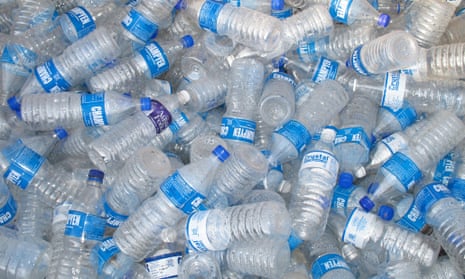Thanks to consumer culture it’s entirely possible to give the Earth a surreptitious kicking on a daily basis. So using face scrubs full of plastic microbeads or disposable wipes just make you look like you’re time efficient and keen to exfoliate (no mention that you’re irreversibly polluting the ocean).
Perhaps the most egregious of all these behaviours is our ongoing commitment to bottled water.
There’s an obvious idiocy here. In the UK our hydration needs can be met from a source that is rigorously tested by the Drinking Water Inspectorate and operates in a supremely low-carbon way (the common carriage of water mains is comparatively efficient and uses little energy). You call it a tap, or a faucet, and it’s one of those shiny things that augments the kitchen sink. Try it. You might like it.
I fear I’m fighting a losing battle. The multinationals invested in bottled water represent some of the biggest companies on earth. We’re sitting ducks. When the market for sugar-sweetened carbonated soft drinks began to decline in the late 1990s giants such as Coca-Cola and PepsiCo knew their future lay in flogging water.
There was some pushback in 2007/2008 along with a campaign to restore public fountains and demand tap water in restaurants. The then UK minister for the environment, Phil Woolas, said bottled water “borders on being morally unacceptable”. Since that time the industry has got its lobbying ducks in a row. Instead of Woolas-type pronouncements, what we tend to get these days are opportunities to debunk “environmental hysteria” (of the type I’m displaying right now) sponsored by the soft drinks industry.
One of the chief tools used to debunk stuff like the fact that US consumers plough through 1,500 single-use plastic water bottles a second and less than 20% are recycled is so-called Life Cycle Assessment . Meanwhile the Bottled Water Information Office makes the point that water bottles use 30% less packaging for bottled water than 15 years ago. Almost all the big brands (and this sector is dominated by multinationals) are now using a bit less plastic to make their bottles (and therefore a bit less oil).
But we’re finding out that once we miss the chance to recycle plastics, they live on in peculiar and troubling ways. We tend to focus on the positive: over 60bn polyethylene terephthalate (PET) bottles were recycled in Europe in 2012. Great, but what of all the ones that weren’t?
Professor Richard Thompson, the marine scientist from Plymouth University who coined the term “microplastics” and has traced how plastics degrade in the ocean, has consistently pointed out that nine different polymers consistent with water bottle production are routinely found in marine samples.
Recycling is famously market based, and at the moment virgin PET is cheap as chips, leading to a huge disincentive to invest in recycling water bottles.
But that’s not the only ethical issue. Right now, California is famously staring down a mega drought. Beverley Hills residents may have to curb water use by 38%. The state’s farmers must be pacified. Governor Jerry Brown’s $1bn drought relief package attempts to address California’s dry reality. But for California’s multinational bottling plants, it’s apparently business as usual.
Except that Nestlé’s bottling plant in Sacramento was shut down by campaigners determined to understand why it was taking precious water. Meanwhile the San Bernardino Desert Sun newspaper found that Nestlé was pumping water from the San Bernardino national forest despite the fact that its permit expired 27 years ago.
Nestlé insists its water use is efficient and has minimal impact on the environment – something that activists reject out of hand.
Companies in the bottled water business might talk a lot about water stewardship and “gentle abstraction” but they are in effect looking to increase abstraction. The for-profit water business is based on continuous bottling to slake the thirst of consumers.
Water marketers have been able to exploit our preoccupation with personal hydration and lack of interest in the water as a global commons. We’re interested in the wrong kind of H2O: “smart water” that contains electrolytes at the expense of resilient, communal sources.

